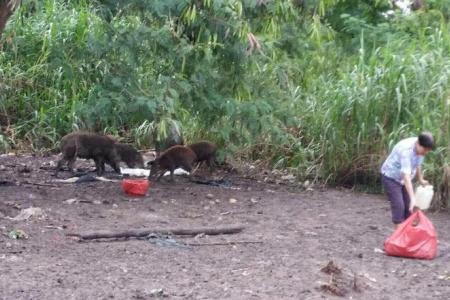Expert: Feeding wild boars causes more harm than good
Woman photographed feeding wild boars in Pasir Ris
When animal activist Anbarasi Boopal saw this photo of a woman feeding wild boars, she was sad that the woman was "putting herself in danger".
And sad that the woman does not even realise the consequences of her actions.
"The wild boars are wild animals that will charge at humans when threatened," said Ms Boopal, 33, who is the deputy chief executive of the Animal Concerns Research and Education Society (Acres).
"It's very sad because despite having good intentions, her actions are causing more harm than good."
By feeding the animals, the woman is creating a link between food and humans, she said.
"Once that happens, they may start charging at humans."
Despite safety warnings against feeding the wild boars, curious visitors continue to frequent Pasir Ris Coast Industrial Park 6, where the photo was taken.
It looks like a scene in the Singapore Zoo because the drain and the fence forms a barrier between the visitors and the wild boars.
But unlike the zoo, the woman who enters the clearing to feed the animals and clean up the rubbish appears to be untrained in dealing with wild animals.
A video and photos of her feeding the animals were posted on a Facebook page for cycling enthusiasts on Sunday.
PRAISED
Several people praised the woman's actions. One person called it a "lovely and heart-warming sight".
Ms Boopal wanted to set these people straight. "People who feed them want to feel good about helping them, but their lack of awareness only creates more problems in the long term," she said.
Ms Boopal recommends a strong outreach to raise awareness about the consequences of feeding wild boars and a nationwide ban on feeding wild animals.
The Agri-Food and Veterinary Authority of Singapore (AVA) also advised the public not to feed the wild boars as this alters their behaviour and may cause them to be reliant on humans for food.
On June 1, the AVA said it had received 27 complaints about wild boars so far this year.
The frequent visits by families are also a growing concern.
"Bringing young children to feed the wild boars is not a good educational message," added Ms Boopal.
When The New Paper revisited the location yesterday, it was evident the visitors were not environmentally friendly.
The area next to the clearing had empty plastic bags and bread tags scattered on the ground and in the drain. Plastic bags, half-eaten apples and whole oranges could be seen strewn around in the clearing.
A cleaner, who wanted to be known only as Mr Lance, 39, said the litter from visitors is a growing problem.
The AVA said "control operations" are ongoing in the Punggol area in response to the feedback of wild boar sightings from the public.
In recent years, wild boars, which are foragers, have been culled when herds grow to a point where they start destroying the natural habitat.

WHEN WILD BOARS ATTACK
As the wild boar population in Singapore grows, more people have been getting hurt in their encounters with these wild animals.
In 2012, an elderly woman broke her pelvis on Pulau Ubin after her excursion group started interacting with and feeding a wild boar and its two piglets.
The 64-year-old was carrying food in a red plastic bag when the wild boar charged at her from behind.
The woman, who fell and broke her pelvis, had to be carried away and was taken to a hospital on the mainland.
She was with a group of 40 when they saw the wild boars.
They even went up to the wild boars, which seemed unafraid of humans, to feed and snap photos of them before the woman was attacked.
FLUNG
Earlier that year, a five-year-old boy was flung a metre after a wild boar rammed into his rear in Bishan-Ang Mo Kio Park.
He was playing near a playground when the wild boar charged and hurled him into the air. He was not seriously injured.
The boar also attacked a patrolling Cisco protection officer, who injured his hand in a fall.
Across the Causeway, an elderly couple died from injuries caused by a wild boar last July.
Mr Loo See Sing, 66, and his wife Madam Liow Mei Lan, 68, were tapping rubber in a plantation in Segamat, Johor, when the wild boar attacked them.
They were found dead with cuts from the boar's tusks all over their bodies.
Get The New Paper on your phone with the free TNP app. Download from the Apple App Store or Google Play Store now



